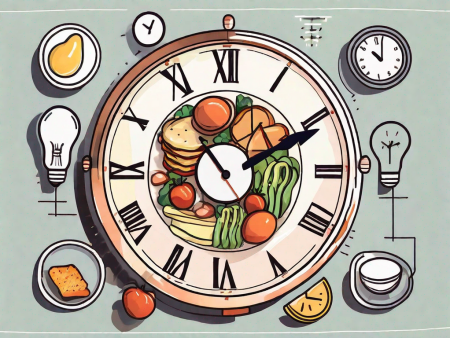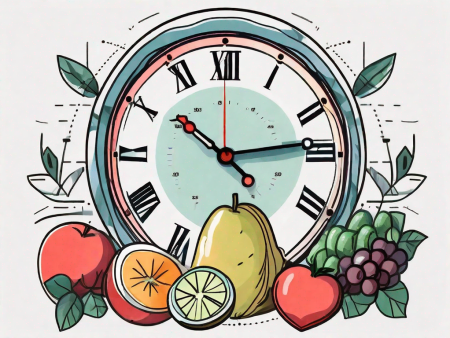Discover the reasons behind a sluggish metabolism and explore effective solutions to boost it.
Why Does Metabolism Slow Down? Exploring the Causes and Solutions

Metabolism – it’s a word that gets thrown around a lot, especially when people talk about weight and fitness. But what exactly is metabolism, and why does it seem to slow down as we get older? In this article, we’ll dive deep into the world of metabolism to understand its role in the body, the factors that influence it, why it slows down, and some solutions to boost it back up. So, grab a cup of coffee (or green tea if you’re feeling extra healthy) and let’s unravel the mysteries of the metabolism!
Understanding Metabolism
Before we delve into the reasons why metabolism slows down, let’s first understand what metabolism actually is. Simply put, metabolism refers to all the chemical processes that occur in our body to maintain life. It’s like the engine under the hood that keeps everything running smoothly.
Metabolism is a fascinating and intricate system that is constantly at work within us. It is responsible for a wide range of functions, from converting the food we eat into energy to regulating our body temperature. Without metabolism, our bodies would not be able to function properly.
The Role of Metabolism in the Body
Metabolism plays a crucial role in our body. It helps to convert the food we eat into energy, which is used for various bodily functions like breathing, digestion, and walking that extra mile to catch the bus.
But metabolism is not just about energy production. It also plays a vital role in maintaining the balance of chemicals and hormones in our body. It helps to break down toxins and waste products, ensuring that our body stays clean and healthy.
The Process of Metabolism
The process of metabolism can be split into two main categories: catabolism and anabolism. Catabolism involves breaking down complex molecules to release energy, while anabolism is all about building complex molecules from simpler ones.
During catabolism, the body breaks down carbohydrates, fats, and proteins into smaller molecules such as glucose, fatty acids, and amino acids. These molecules are then used as fuel for energy production.
Anabolism, on the other hand, is responsible for building and repairing tissues. It involves the synthesis of complex molecules like proteins, nucleic acids, and glycogen from simpler building blocks.
Both catabolism and anabolism are essential for the proper functioning of our body. They work hand in hand to ensure that we have enough energy for our daily activities and that our cells and tissues are constantly being repaired and renewed.
Metabolism is a highly regulated process that is influenced by a variety of factors, including genetics, age, gender, and lifestyle. While some people may naturally have a faster metabolism, others may have a slower one. Understanding the factors that affect metabolism can help us make informed choices about our diet and lifestyle to optimize our metabolic health.
Factors That Influence Metabolism
Now that we have a grasp on what metabolism is, let’s take a closer look at the factors that can influence its speed.
Metabolism, the process by which our bodies convert food and drink into energy, is a complex system that can be influenced by various factors. Understanding these factors can help us make informed choices to optimize our metabolic rate and overall health.
Age and Metabolism
It’s sad but true – as we get older, our metabolism starts to slow down. Blame it on Father Time! This decrease in metabolic rate can lead to weight gain and a decrease in overall energy levels. The aging process naturally causes a loss of muscle mass, which in turn lowers the number of calories burned at rest. Additionally, hormonal changes that occur with age can further contribute to a slower metabolism.
But fear not, there are ways to combat this slowdown. Engaging in regular physical activity, such as strength training and cardiovascular exercises, can help preserve muscle mass and boost metabolism. Additionally, adopting a balanced diet that includes lean proteins, whole grains, fruits, and vegetables can provide the necessary nutrients to support a healthy metabolism.
Genetics and Metabolism
Our DNA plays a role in determining our metabolic rate. Some lucky individuals are born with a faster metabolism, while others have to work a little harder to keep it revving. Genetic variations can affect the efficiency of enzymes involved in metabolism, influencing how quickly or slowly our bodies process nutrients.
However, it’s important to note that genetics are just a small piece of the puzzle. While we may have inherited certain metabolic tendencies, our lifestyle choices can still have a significant impact on our metabolism. By adopting healthy habits, such as regular exercise and a balanced diet, we can optimize our metabolic rate regardless of our genetic predispositions.
Lifestyle and Metabolism
Thinking of binge-watching that new Netflix series? Hold on! Sedentary lifestyles, lack of physical activity, and poor eating habits can all contribute to a sluggish metabolism. When we lead a sedentary lifestyle, our bodies don’t need to burn as many calories, leading to a slower metabolic rate.
Incorporating exercise and a well-balanced diet into your daily routine can work wonders in boosting your metabolic rate. Regular physical activity, such as brisk walking, jogging, or strength training, can increase muscle mass and improve metabolic efficiency. Additionally, consuming a diet rich in lean proteins, whole grains, fruits, and vegetables can provide the necessary nutrients to support a healthy metabolism.
Remember, small changes can make a big difference. Opting for the stairs instead of the elevator, taking short breaks to stretch and move throughout the day, and choosing nutrient-dense foods can all contribute to a more active metabolism.
So, whether it’s age, genetics, or lifestyle choices, understanding the factors that influence metabolism empowers us to make positive changes and optimize our body’s energy production. By adopting a holistic approach that combines regular physical activity, a balanced diet, and other healthy habits, we can support a healthy metabolism and overall well-being.
Why Metabolism Slows Down
Now that we understand the factors that influence metabolism, let’s dig deeper into why it decides to slow down on us.
Metabolism, the process by which our body converts food and drinks into energy, is a complex system that can be influenced by various factors. Understanding why our metabolism slows down is crucial in maintaining a healthy weight and overall well-being.
The Impact of Aging on Metabolism
As we age, our body goes through various changes, including a decrease in muscle mass and an increase in body fat. These changes can lead to a decrease in metabolic rate, making it more challenging to maintain a healthy weight. Additionally, the decline in organ function and hormonal changes that come with aging can further contribute to a slower metabolism.
However, there are ways to combat the effects of aging on metabolism. Regular exercise, particularly strength training, can help build and maintain muscle mass, which in turn can boost metabolic rate. Eating a balanced diet that includes lean protein, whole grains, fruits, and vegetables can also support a healthy metabolism.
The Effect of Sedentary Lifestyle on Metabolism
Sitting on the couch all day might sound tempting, but it can wreak havoc on your metabolism. When you lead a sedentary lifestyle, your body doesn’t need as much energy, so it adapts by slowing down your metabolic rate. This can lead to weight gain and increased risk of various health conditions.
To counteract the negative effects of a sedentary lifestyle, it’s important to incorporate physical activity into your daily routine. Engaging in regular exercise, such as walking, jogging, or cycling, can help increase your metabolic rate and burn calories. Additionally, taking frequent breaks from sitting and incorporating movement throughout the day can also make a significant difference.
Hormonal Changes and Metabolism
Ladies, you’ll relate to this one. Hormonal changes that occur during menopause can also impact your metabolism. The decrease in estrogen levels can lower your metabolic rate, making it more challenging to maintain or lose weight. This hormonal shift can also lead to an increase in body fat, particularly around the abdomen.
Fortunately, there are strategies to manage the effects of hormonal changes on metabolism. Regular exercise, including both cardiovascular and strength training exercises, can help boost metabolic rate and maintain muscle mass. Eating a balanced diet that includes foods rich in calcium and vitamin D can also support bone health and mitigate the impact of hormonal changes on metabolism.
Additionally, managing stress levels, getting enough sleep, and staying hydrated are essential for maintaining a healthy metabolism. Stress and lack of sleep can disrupt hormonal balance and negatively affect metabolic function.
In conclusion, understanding why metabolism slows down is crucial in maintaining a healthy weight and overall well-being. By incorporating regular exercise, eating a balanced diet, and managing stress levels, we can support our metabolism and keep it functioning optimally.
Debunking Metabolism Myths
Now that we’ve uncovered the reasons behind a slowing metabolism, let’s debunk some common myths and separate fact from fiction.
The Truth about Fast and Slow Metabolism
Some people claim to have a lightning-fast metabolism, while others blame their slow metabolism for their weight struggles. But the truth is that the variations between individuals’ metabolic rates are relatively small. So, don’t use your metabolism as an excuse to down that entire tub of ice cream!
Metabolism and Weight Loss: What’s the Connection?
Yes, a higher metabolic rate can make it slightly easier to lose weight. However, the real secret to shedding those pounds lies in creating a calorie deficit through a combination of healthy eating and regular exercise. So, put down that “miracle” metabolism-boosting supplement and lace up those running shoes instead!
Solutions to Boost Metabolism
Now that we’ve explored the causes behind a sluggish metabolism, let’s discover some solutions to rev it up and get those engines roaring again!

Dietary Changes for Improved Metabolism
What goes into your body directly impacts your metabolic rate. Incorporating metabolism-boosting foods like lean proteins, whole grains, and fruits and vegetables can help fire up your metabolism. And don’t forget to spice things up with some metabolism-boosting spices like cayenne pepper and turmeric!
The Role of Exercise in Boosting Metabolism
Exercise is the ultimate metabolism-boosting tool. Incorporating both cardiovascular exercises and strength training into your routine can help build muscle, increase your metabolic rate, and keep those unwanted pounds at bay. It’s time to break a sweat and embrace that post-workout endorphin rush!
Importance of Sleep and Hydration in Metabolism
Getting enough quality sleep and staying hydrated are two often overlooked factors in maintaining a healthy metabolism. Aim for at least 7-8 hours of sleep each night and drink plenty of water throughout the day. You’ll be amazed at how much these seemingly small changes can impact your metabolism.
So, there you have it – the ins and outs of metabolism. It’s a complex process influenced by various factors, but with some lifestyle adjustments and a touch of determination, you can boost your metabolism and achieve your health and fitness goals. Remember, your metabolism might be slowing down, but that doesn’t mean you can’t speed it back up and conquer the world – one healthy choice at a time!








Thanks for sharing. I read many of your blog posts, cool, your blog is very good.
Thank you for your sharing. I am worried that I lack creative ideas. It is your article that makes me full of hope. Thank you. But, I have a question, can you help me?
Thank you for your sharing. I am worried that I lack creative ideas. It is your article that makes me full of hope. Thank you. But, I have a question, can you help me?
Hello there! Do you know if they make any plugins to help
with SEO? I’m trying to get my website to rank for some targeted
keywords but I’m not seeing very good gains. If you know of any please share.
Thank you! I saw similar blog here: Warm blankets
Can you be more specific about the content of your article? After reading it, I still have some doubts. Hope you can help me.